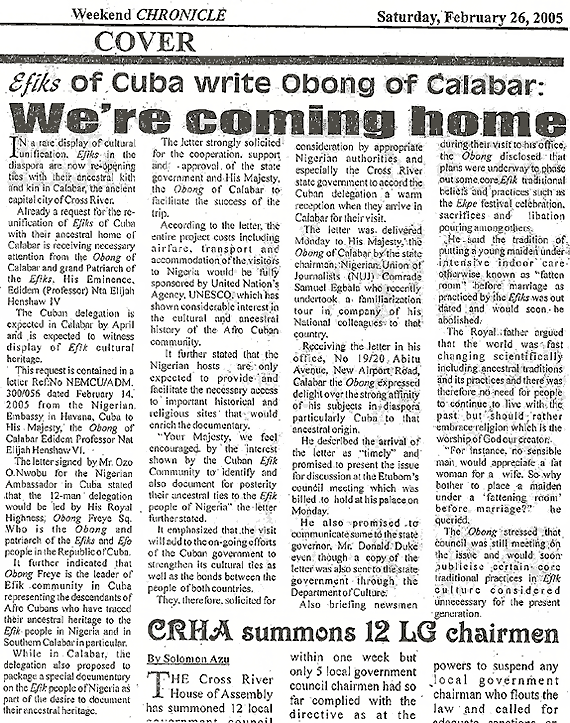Links |
Efiks of Cuba Write Obong of Calabar: We're coming home
Weekend Chronicle of Calabar, Cross River Delta, Nigeria, 2/26/05
The article below reports on a parallel,
"official" effort led by the Buro de Abakuá in Havana to explore
the type of contacts made at the Ekpe
Festival in December 2004.
There is significant continuity with Calabar in Cuba; there is also significant discontinuity. All blood lines and dynasties were destroyed through the
migration experience to the Caribbean. Some rare Cuban families may retain a memory of their African origin with a sense of lineage from there. But in the
Americas, intermarriages between Africans, Americans, Asians, and Europeans effectively wiped away all biological blood lines to create the
creole. Because of this, contrary to this article in the Chronicle of Calabar, there is no ‘Efik community in Cuba’, nor anywhere else in the Americas. Cuban
Abakuá is a spiritual practice and mutual-aid society, serving as a living testament to the origin of many African migrants.
Abakuá is better described as ‘lower Cross River culture’ in Cuba, instead of
being tied to a single ethnicity.
The Obong (paramount ruler) of Calabar is a title for life given to an Etubom (Head of House) selected by a council of Etuboms. Since there is no House
structure in Cuba, there are no Etuboms, and there can be no Obong. Cuban Abakuá have no centralized
organization, just as is the case with other Cuban African religions. Each lodge is independent, having its
own Iyamba and other grades. Instead of being Efik, the Cuban Mr. Freyre is Iyamba of the Efut lodge known as Erume Efó.
He is not a ‘paramount ruler’, but is one out of the 150 or so Iyambas in Cuba
today.
Ideally, those Cubans who are most knowledgeable of Abakuá history would
be able to travel to Nigeria, so as to make detailed identifications
between Ekpe lodges in Calabar and lodges in Cuba, leading to a better
understanding of "Calabarí" migration. This is clearly possible
at this point in history.
-- Andy Petit
|




